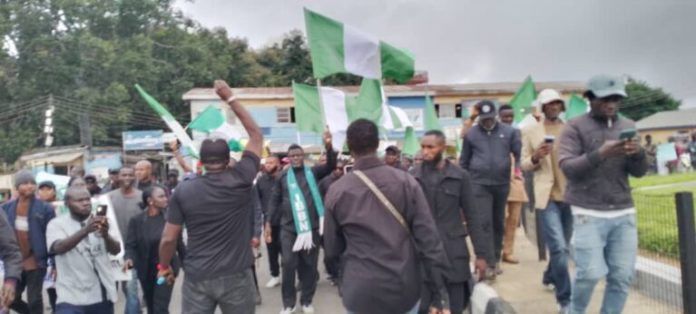In northern Nigeria, millions of residents are under a 24-hour curfew due to nationwide protests against the rising cost of living.
Governments in Kano, Jigawa, Yobe, and Katsina states have ordered residents to stay indoors on Friday, effectively preventing participation in the demonstrations.
The curfew is a response to reports that “hoodlums” have taken advantage of the protests to loot and vandalize properties.
The security presence across the country is heightened, with nine additional “days of rage” planned by protest organizers.
The first day of protests saw large crowds in Kano, where police used live ammunition, tear gas, and hot water to disperse thousands of demonstrators.
Three people were killed, and many others were injured. Looters also raided a warehouse near the Kano governor’s residence. Authorities have arrested 269 individuals and recovered numerous items, including 25-litre cartons of groundnut oil.
Amnesty International reported that 13 protesters were killed by security forces nationwide on the first day.
In Borno State, police chief Kayode Egbetokun reported that four people were killed and 34 injured by an explosion within a protest crowd.
The explosion, which occurred in the state capital Maiduguri, is suspected to be linked to the jihadist group Boko Haram. A prior explosion in Kawori killed 16 people at a teashop.
On Friday, protests continued in major cities, including Abuja, where police used tear gas to disperse crowds, and Lagos, where some banks and shops reopened despite persistent internet issues. Inspector-General Egbetokun has placed police on “red alert” to maintain public safety.
The protests, organized through social media under the hashtag #EndBadGovernance, were inspired by recent successful demonstrations in Kenya.
Many Nigerians are angry over President Bola Tinubu’s removal of fuel subsidies, which has led to soaring pump prices and increased costs of goods. Protesters are also calling for reforms in the electoral system and judiciary.
Kano’s governor’s spokesperson, Abba Kabir Yusuf, stated that while protests in Kano had been mostly peaceful, the curfew was necessary to address the violence and looting.
Yobe State and Katsina State have also imposed curfews to curb vandalism and looting attributed to “miscreants” exploiting the protests.



